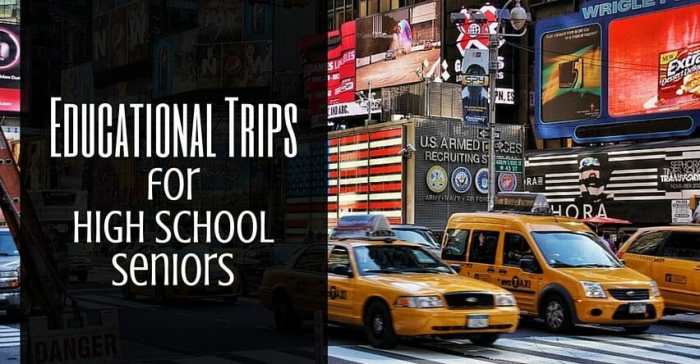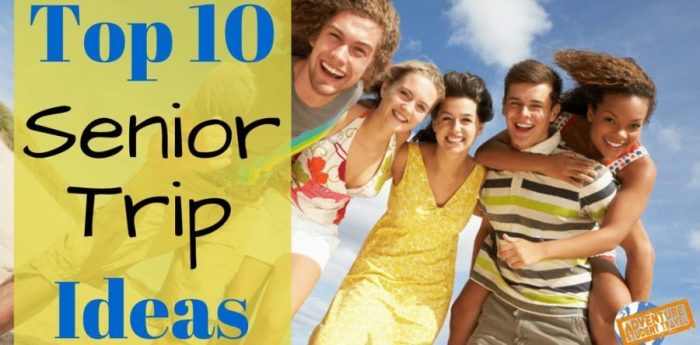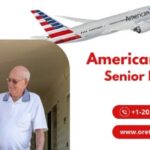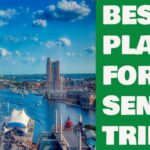Educational Trips For Seniors represent a burgeoning sector of the travel industry, catering to a demographic increasingly seeking enriching and engaging experiences. These journeys offer more than just sightseeing; they provide opportunities for intellectual stimulation, social interaction, and the creation of lasting memories. From exploring historical landmarks to immersing oneself in vibrant cultures, these trips are carefully designed to meet the unique needs and interests of older adults, ensuring both comfort and intellectual enrichment.
This guide delves into the planning, logistics, accessibility, and marketing aspects of crafting successful and rewarding educational travel experiences for seniors.
Types of Educational Trips for Seniors

Educational travel offers seniors a unique opportunity to engage in lifelong learning, explore new cultures, and enrich their lives beyond the typical retirement activities. Well-planned trips cater to diverse interests and physical capabilities, ensuring a stimulating and rewarding experience. The key is to select trips that align with individual preferences and health considerations.
Categorization of Educational Trip Options for Seniors
The following table categorizes educational trip options suitable for seniors, considering their varied interests and physical abilities. Each trip type provides unique learning opportunities, fostering intellectual stimulation and personal growth.
| Trip Type | Description | Target Audience (Senior Interests) | Example Locations |
|---|---|---|---|
| Historical Sites | Visits to significant historical locations, museums, and landmarks, providing insights into past events and civilizations. Guided tours often enhance the learning experience. | History buffs, archaeology enthusiasts, those interested in political science or social studies. | Rome, Italy; Gettysburg, Pennsylvania; Machu Picchu, Peru |
| Cultural Experiences | Immersive experiences exploring the arts, traditions, and lifestyles of different cultures. This could involve attending performances, visiting local markets, or participating in cultural workshops. | Art lovers, music enthusiasts, individuals interested in anthropology or sociology, foodies. | Kyoto, Japan; San Miguel de Allende, Mexico; Paris, France |
| Nature Tours | Journeys to natural wonders, including national parks, wildlife reserves, and botanical gardens. These trips often involve moderate physical activity, such as hiking or birdwatching. | Nature enthusiasts, bird watchers, photographers, those seeking relaxation and rejuvenation in natural settings. | Yellowstone National Park, USA; Galapagos Islands, Ecuador; Serengeti National Park, Tanzania |
| Educational Workshops | Structured learning experiences focusing on specific subjects, such as painting, photography, cooking, or language learning. These workshops are often held in inspiring locations and offer opportunities for interaction with instructors and fellow participants. | Individuals seeking to develop new skills, pursue hobbies, or engage in intellectual stimulation in a group setting. | Florence, Italy (painting workshop); Provence, France (photography workshop); Cusco, Peru (Quechua language course) |
Comparison of Trip Types: Pros and Cons
Choosing the right educational trip depends on several factors. The following table highlights the pros and cons of each type, considering physical demands, cost, and accessibility.
| Trip Type | Pros | Cons |
|---|---|---|
| Historical Sites | Rich learning experience, often well-structured tours, diverse locations. | Can involve significant walking, potential for crowds, some sites may have limited accessibility. |
| Cultural Experiences | Immersive and engaging, opportunities for interaction, broad range of activities. | Can be more expensive, may require a higher level of physical stamina depending on the activities. |
| Nature Tours | Relaxing and rejuvenating, opportunities for physical activity (though intensity varies), stunning scenery. | Can involve strenuous hikes or long travel times, weather dependent, potential for wildlife encounters (positive or negative). |
| Educational Workshops | Focused learning, opportunity to develop new skills, smaller group sizes. | Can be more expensive than other trip types, limited availability, requires a certain level of commitment. |
Planning and Logistics

Careful planning and meticulous logistical arrangements are paramount to ensuring a smooth and enriching educational trip for seniors. Overlooking even minor details can significantly impact the overall experience, potentially leading to stress and discomfort for participants. A well-structured plan addresses transportation, accommodation, daily schedules, and contingency measures, fostering a positive and memorable journey.
Effective trip planning involves a multi-stage process encompassing itinerary development, resource allocation, risk assessment, and communication strategies. This ensures a seamless flow of activities and addresses potential challenges proactively, minimizing disruptions and maximizing enjoyment for all participants. For instance, pre-booking accommodations and transportation can avoid last-minute complications and secure better rates. Similarly, coordinating with local guides and service providers ensures the smooth execution of planned activities.
Sample Educational Trip Itinerary
This itinerary example details a five-day educational trip to Colonial Williamsburg, Virginia, focusing on American history. It includes daily schedules, transportation, and accommodation information. Adaptations for different destinations and trip durations are straightforward.
| Day | Time | Activity | Transportation | Accommodation |
|---|---|---|---|---|
| Day 1 | 8:00 AM | Depart from designated meeting point | Charter Bus | The Williamsburg Lodge |
| 12:00 PM | Lunch at a local restaurant | |||
| 1:30 PM | Guided tour of Colonial Williamsburg | Walking Tour | ||
| 6:00 PM | Dinner at the King’s Arms Tavern | |||
| 7:30 PM | Relaxation/Free time | |||
| Day 2 | 9:00 AM | Visit Jamestown Settlement | Charter Bus | The Williamsburg Lodge |
| 1:00 PM | Lunch at Jamestown Settlement | |||
| 2:30 PM | Visit Yorktown Battlefield | Charter Bus | ||
| 6:00 PM | Dinner at the hotel | |||
| 7:30 PM | Optional historical presentation | |||
| Day 3 | 9:00 AM | Visit the Governor’s Palace | Walking Tour | The Williamsburg Lodge |
| 12:00 PM | Lunch at a cafe in Colonial Williamsburg | |||
| 1:30 PM | Attend a craft demonstration | |||
| 5:00 PM | Free time for shopping or exploring | |||
| 7:00 PM | Dinner at a restaurant of choice | |||
| Day 4 | 9:00 AM | Visit the DeWitt Wallace Decorative Arts Museum | Walking Tour | The Williamsburg Lodge |
| 12:00 PM | Lunch at the museum cafe | |||
| 1:30 PM | Free time for personal exploration | |||
| 6:00 PM | Farewell Dinner | |||
| Day 5 | 8:00 AM | Breakfast at the hotel | The Williamsburg Lodge | |
| 9:00 AM | Depart for home | Charter Bus |
Essential Items and Documents Checklist
A comprehensive checklist ensures seniors have everything needed for a comfortable and worry-free trip. Items should be organized for easy packing and accessibility. This checklist covers essential documents, medications, personal care items, and comfort items.
- Passport/Driver’s License
- Travel Insurance Documents
- Medication List and Prescriptions
- Copies of Important Documents (stored separately)
- Comfortable Walking Shoes
- Appropriate Clothing for all weather conditions
- Personal Toiletries and Medications
- Small First-Aid Kit
- Reading Material or Entertainment
- Sufficient Cash and Credit Cards
Managing Health Concerns and Emergencies
Prior to departure, a thorough health assessment for each participant is crucial. This should involve consultation with their physician to address any pre-existing conditions and ensure appropriate medication is available. Emergency contact information should be readily accessible to both the participants and the trip organizers.
The itinerary should incorporate sufficient rest periods and flexibility to accommodate unexpected health issues. Access to healthcare facilities along the route should be identified, and a designated individual should be responsible for managing medical emergencies. For instance, carrying a list of local doctors and hospitals, along with emergency contact numbers, is crucial. Furthermore, providing participants with clear instructions on how to contact emergency services in the destination country adds an additional layer of safety.
Pre-arranged transportation for medical emergencies, such as ambulance services, adds another level of preparedness.
Marketing and Promotion
Effective marketing is crucial for attracting senior travelers to educational trips. A multi-pronged approach, encompassing targeted marketing materials and strategic social media engagement, is essential for maximizing reach and conversion rates. Leveraging partnerships with established organizations further amplifies the campaign’s impact.
Marketing Materials: Brochure Description
A compelling brochure is the cornerstone of attracting potential participants. The design should be visually appealing, easy to read, and highlight the unique value proposition of the trip.
Discover the world with enriching educational experiences designed specifically for discerning senior travelers. Our meticulously planned itineraries combine captivating destinations with insightful lectures, engaging workshops, and opportunities for cultural immersion. Enjoy comfortable accommodations, expert guidance, and the camaraderie of fellow travelers who share your thirst for knowledge and adventure. Space is limited, so reserve your place today!
Social Media Campaign Strategy
A robust social media campaign utilizes diverse platforms to reach the target demographic. Targeting seniors requires understanding their online habits and preferences.Facebook remains a dominant platform for seniors, allowing for targeted advertising based on demographics and interests. Visually appealing posts featuring stunning imagery from past trips and testimonials from previous participants will resonate strongly. Instagram, though visually driven, can be effectively used with high-quality photographs and videos showcasing the trip’s highlights.
Consider using short, engaging video clips showcasing the trip’s experiences. Twitter can be used for quick updates, announcements, and engaging with potential travelers. Finally, a well-maintained website with a dedicated landing page for the trip is vital.
Benefits of Partnerships
Collaborating with senior organizations (e.g., AARP, local senior centers) and reputable travel agencies specializing in senior travel offers significant advantages. These partnerships provide access to pre-qualified audiences already interested in travel and educational opportunities. Senior organizations offer credibility and trust, while travel agencies handle logistics, bookings, and customer service, freeing up resources for trip planning and marketing. Partnering organizations can also assist with direct mail campaigns to their existing membership bases, greatly expanding reach beyond digital platforms.
For example, a partnership with AARP could offer access to their substantial mailing list and member networks, greatly increasing the potential reach and impact of the marketing campaign. Similarly, a travel agency with established trust and experience in senior travel could handle much of the logistical and customer service aspects, reducing operational burden.
Post-Trip Activities and Engagement
Sustaining the educational momentum generated during senior educational trips requires a strategic approach to post-trip engagement. This involves fostering continued discussion, providing opportunities for reflection, and encouraging further learning related to the trip’s themes. A well-structured post-trip program can significantly enhance the overall value and lasting impact of the experience.Facilitating post-trip discussions and the sharing of experiences among participants is crucial for reinforcing learning and building community.
Several methods can be employed to achieve this. These methods aim to leverage the shared experience to create a lasting bond among participants and ensure the educational benefits extend beyond the trip itself.
Post-Trip Discussion Methods
Creating opportunities for continued dialogue after the trip is essential for solidifying the knowledge gained and fostering a sense of community among participants. This can be achieved through various methods, including online forums, social media groups, or organized gatherings. For instance, a dedicated Facebook group could allow participants to share photos, discuss memorable moments, and ask questions long after the trip concludes.
Alternatively, a virtual meeting or even a small in-person reunion could provide a more structured platform for sharing experiences and insights. The key is to provide a comfortable and accessible platform for continued interaction.
Sample Follow-Up Email with Feedback Survey, Educational Trips For Seniors
Subject: Relive Your [Trip Name] Adventure & Share Your Feedback!Dear [Senior’s Name],We hope you had a wonderful time on our recent educational trip to [Destination]! We’re eager to hear about your experiences. To help us improve future trips and better understand your journey, we’d be grateful if you could take a few minutes to complete this short survey: [Survey Link].The survey will only take approximately 5 minutes to complete.
Your feedback is invaluable to us and will help us shape future educational adventures for seniors.In the meantime, we encourage you to revisit your memories by sharing photos or anecdotes on our Facebook group: [Facebook Group Link]. We’d love to see your pictures and hear your stories!Sincerely,The [Organization Name] Team
Maintaining Engagement and Continued Learning
Sustaining engagement post-trip requires a multifaceted approach. Providing access to supplementary resources, such as online articles, documentaries, or books related to the trip’s themes, can encourage further learning. Furthermore, organizing online lectures or webinars with experts in relevant fields could offer additional insights and deepen participants’ understanding. For example, if the trip focused on historical sites, a follow-up webinar with a historian specializing in the region could provide a more in-depth analysis of the historical context.
The aim is to provide stimulating content that extends the educational journey well beyond the trip’s conclusion.
Ultimately, Educational Trips For Seniors offer a compelling blend of learning, exploration, and social connection. By carefully considering accessibility, budget, and marketing strategies, providers can create transformative experiences that empower seniors to continue learning and exploring the world around them. The enduring value lies not just in the destinations visited, but in the enriched lives and lasting bonds forged along the way.
The future of senior travel lies in experiences that are both enriching and fulfilling, prioritizing both intellectual growth and personal well-being.

